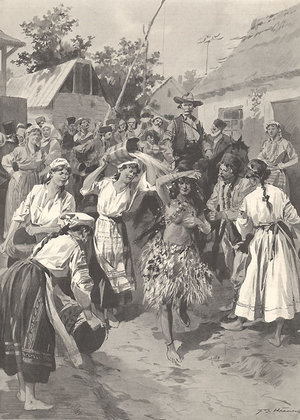| Revision as of 19:37, 12 September 2011 editPichpich (talk | contribs)Autopatrolled, Extended confirmed users, New page reviewers, Pending changes reviewers, Rollbackers88,556 edits cat← Previous edit | Revision as of 23:17, 14 September 2011 edit undoCydebot (talk | contribs)6,812,251 editsm Robot - Moving category Rainmaking to Category:Rainmaking (ritual) per CFD at Misplaced Pages:Categories for discussion/Log/2011 September 12.Next edit → | ||
| Line 20: | Line 20: | ||
| ] | ] | ||
| ] | ] | ||
| ] | ] | ||
| ] | ] | ||
Revision as of 23:17, 14 September 2011

Paparuda is a Romanian and Bulgarian rain ritual, probably of pagan origin, performed in the spring and in times of severe drought.
A girl, wearing a skirt made of fresh green knitted vines and small branches, sings and dances through the streets of the village, stopping at every house, where the hosts pour water on her. She is accompanied by the people of the village who dance and shout on the music. The custom has attributed a specific type of dance and a specific melody.
A similar Romanian rain ritual is the Caloian.
The name is probably derived from Perperuna, which in its turn is a Slavic (south slavic) goddess, or as Sorin Paliga suggests, is a divinity from the local Thracian substratum.
Like the Dodola (dudula, dudulica, dodolă in Romanian, dudulë in Albanian, tuntule in Greek, dudulya and didilya in South Slavic languages), which is another name for the same custom holding similar rituals, compared by Decev with Thracian anthroponyms (personal names) and toponyms (place names) (such as Doidalsos, Doidalses, Dydalsos, Dudis, Doudoupes, etc.) and argued by Paliga to be of Thracian origin, the Paparuda is found only at Romanians (păpărudă), Aromanians (pirpirună) and South Slavs (peperuda, perperuna).
The name of Dodola is possibly cognate with the Lithuanian word for thunder: dundulis.
References
- ^ Sorin Paliga: "Influenţe romane și preromane în limbile slave de sud" .pdf
- D. Decev, Die thrakischen Sprachreste, Wien: R.M. Rohrer, 1957, pages 144, 151
This Romania-related article is a stub. You can help Misplaced Pages by expanding it. |
This Bulgaria-related article is a stub. You can help Misplaced Pages by expanding it. |